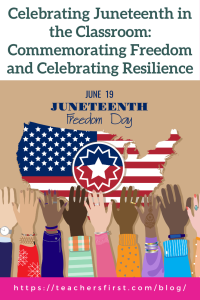Juneteenth has never been a celebration of victory or an acceptance of the way things are. It’s a celebration of progress. It’s an affirmation that despite the most painful parts of our history, change is possible—and there is still so much work to do.
Barack Obama
As educators, you have the honor of imparting knowledge and nurturing a deep understanding of our shared history among students. Juneteenth, widely recognized as Freedom Day or Emancipation Day, is an important event in American history as it commemorates the emancipation of enslaved African Americans. By teaching our students about Juneteenth, we empower them to grasp the struggles endured in the pursuit of freedom, acknowledge the invaluable contributions of African Americans, and actively strive for a more inclusive and just society. In this blog, we will explore strategies that can support you in effectively teaching the history of Juneteenth.
Authentically Teach the History
When planning to educate your students about the significance of Juneteenth, consider engaging students with primary and secondary sources. Exposing them to primary and secondary sources allows them to develop critical thinking skills and connect with historical perspectives. The National Archives offers a range of primary sources related to Juneteenth and the history of slavery in the United States. Their website provides access to historical documents, photographs, and records that shed light on the emancipation of enslaved individuals. The Library of Congress website can be an incredibly valuable resource for teaching Juneteenth. The website includes documents that share firsthand accounts, historical records, and personal narratives. These documents include a digitized version of the Emancipation Proclamation, an extensive collection of slave narratives, often recorded during the Works Progress Administration (WPA) era in the 1930s, and letters/correspondence of individuals during the emancipation period.
Engage in Discussions
After students have explored and learned about Juneteenth, consider facilitating intentional conversations about the impact of slavery and the ongoing fight for equality. Encourage students to share their thoughts, feelings, and reflections. Create virtual discussion forums on platforms such as Google Classroom or Flip (reviewed here) where students can have ongoing opportunities to participate in conversations related to Juneteenth.
Read Relevant Literature
Incorporate literature exploring Juneteenth themes that can be a springboard to meaningful discussions and deeper exploration. A few books that can be shared with students are:
- Juneteenth for Mazie by Floyd Cooper.
- All Different Now: Juneteenth, the First Day of Freedom by Angela Johnson can be a starting point for meaningful discussions and deeper exploration.
- Opal Lee and What it Means to be Free: The True Story of the Grandmother of Juneteenth by Alice Faye Duncan.
- The Road to Freedom: A Story of the Reconstruction by Jabari Asim.
You can also check out our Reading Treks, which include more stories and resources about African American history. StoryCorps (reviewed here) also houses an amazing collection of Juneteenth stories students can explore.
However you decide to teach students about Juneteenth, know that when you do, it will equip our students with a deeper appreciation of African American history and empower them to contribute to a more inclusive society. Therefore, let us embrace the teaching of Juneteenth as a meaningful and transformative educational experience.
What is your favorite resource for teaching about Juneteenth? Share your ideas in the comments below so we can learn together.


